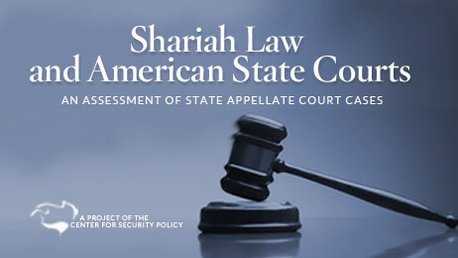Shariah Law and American State Courts: An Assessment of State Appellate Court Cases
This study evaluates published appellate legal cases that involved “conflict of law” issues between Shariah (Islamic law) and American state law.

Shariah: Highly Relevant TCSN; ACSY
Husband and wife were both Pakistani citizens. Wife filed for divorce in a New Jersey court alleging that her husband had abandoned her. Husband answered the divorce suit by stating that he had already been granted a divorce under Pakistani law; and thus, the trial court was without jurisdiction to divide the marital estate. The trial court ruled that Pakistani law violated New Jersey public policy because of its gross bias against the wife. The trial judge invalidated the Pakistani divorce and ordered husband to pay spousal maintenance to wife.
The New Jersey appellate court did not show much concern regarding whether the Pakistani divorce court offended New Jersey public policy. Instead, the appellate court held that the trial court should have recognized the Pakistani divorce and should not have ordered husband to pay spousal maintenance to wife because the couple’s Islamic pre-marital agreement did not provide for spousal maintenance and did not allow wife to take an interest in husband’s property. The appellate court stated that the pre-marital agreement was freely negotiated, but apparently ignored the fact that the couple’s parents negotiated the agreement and the wife had no role in negotiating the pre-marital agreement that would cause her to be without spousal maintenance and without an interest in marital assets acquired by husband.
5. Tarikonda v. Pinjari, No. 287403 (Mich. Ct. App. 2009).
Shariah: Highly Relevant TCSY; ACSN
Tarikonda (wife) and Pinjari (husband) were married in India in 2001. In April 2008, Pinjari obtained an Islamic summary divorce known as talaq against Tarikonda. In May 2008, Tarikonda, possibly without knowing about the talaq, filed for divorce in Michigan. Pinjari filed a motion requesting that the Michigan trial court recognize the talaq divorce and dismiss Tarikonda’s divorce complaint. The trial court granted comity to the talaq Pinjari pronounced in India and dismissed Tarikonda’s complaint. The Michigan appellate court reversed the trial court holding that talaq violated Tarikonda’s right to due process because: (a) she had no prior notice of the talaq pronouncement; (b) she had no right to be present at the pronouncement and did not have an attorney; and (c) the talaq provided no opportunity for a hearing. The Michigan appellate court also held that talaq violates equal protection because women do not also enjoy the right to pronounce talaq. Additionally, the Michigan appellate court held that talaq violates Michigan public policy because, upon divorce, Islamic law allows women to recover only the property that is in their names while Michigan law provides for an equitable division of the marital estate.
6. Karson v. Soleimani, Nos. B216360, B219698 (Cal. Ct. App. 2010).
Shariah: Highly Relevant TCSY; ACSN
Kioumars Ardakani, a life-long resident of Iran, was estranged from his second wife, Soleimani, when he died in Iran without leaving a will. Karson was Ardakani’s daughter from a previous marriage and was Soleimani’s stepdaughter. Karson was a Muslim and both Ardakani and Soleimani were of the Bahai faith. Ardakani’s estate included three parcels of real property in Iran. Karson filed suit in a California court alleging that Soleimani, Soleimani’s attorney in Iran, and other family members who lived in Iran defrauded Karson out of her interest in her father’s estate. Soleimani filed a motion to dismiss Karson’s suit on the basis that Iran was a more convenient forum to try the case than was California. The trial court found that Iran was a more suitable forum to hear Karson’s suit and granted Soleimani’s motion to dismiss. The California appellate court reversed the trial court and ordered Karson’s suit be heard in California. The appellate court held that Iran was not an appropriate forum because Iranian law did not protect the parties’ due process rights and discriminated against women and religious minorities such as the Bahai.
- LIVE NOW – Weaponization of US Government Symposium - April 9, 2024
- CSP author of “Big Intel” is American Thought Leaders guest on Epoch TV - February 23, 2024
- Four weeks after release, Big Intel remains a #1 Amazon bestseller - February 13, 2024
